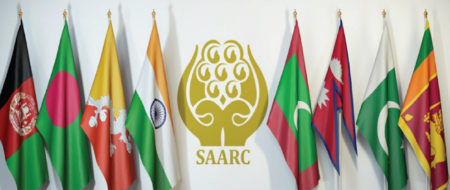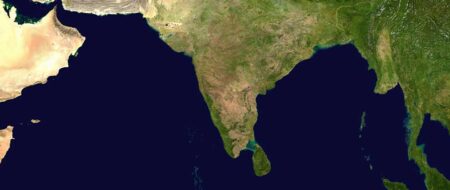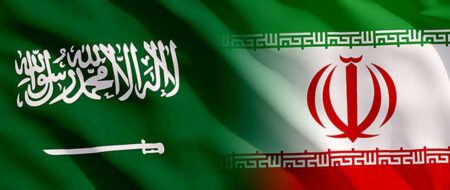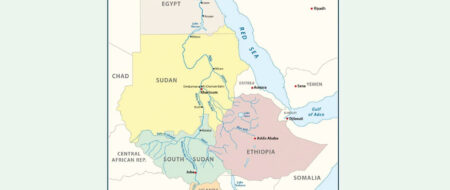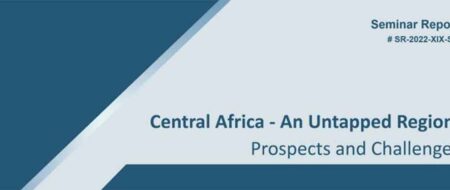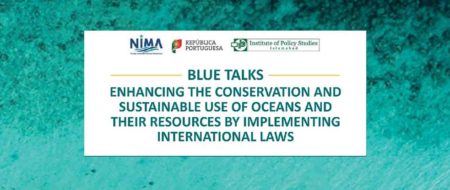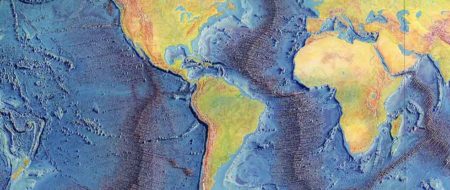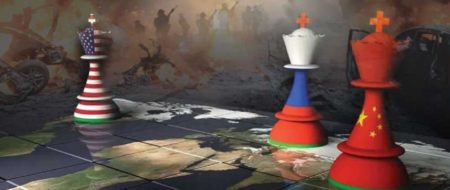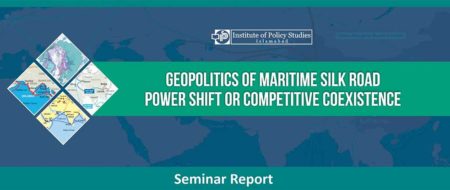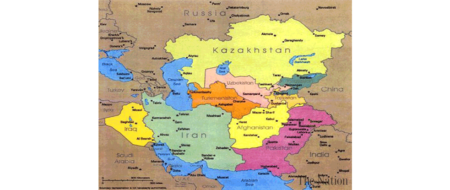The Empire and the War for Muslim Minds
Much of the problem with US policy is encapsulated in the phrase “the war for Muslim minds.” First of all, “war” is the wrong metaphor for a need for more dialogue and interaction on the basis of justice.
Policy Perspectives , Vlm 5, No.1
The Process of Empire Building
Robert W. Jensen·
Much of the problem with US policy is encapsulated in the phrase “the war for Muslim minds.” First of all, “war” is the wrong metaphor for a need for more dialogue and interaction on the basis of justice. Secondly, although it uses the plural — “minds” — to refer to the Muslim viewpoint, the phrase nevertheless comes in contrast to the US approach of seeing it as a single monolithic Muslim mind.
It is now routine for people around the world, even in the United States, to speak of the United States as an empire. This would not have been the case before 9/11. After 9/11, one of the mainstream commentators in the US, Anthony Gregory, wrote that it was time we stopped pretending we were not an empire and went about the business of figuring out how to run the world more efficiently. The process of empire building, especially after World War II, is a bipartisan project in the United States, which knows no allegiance to party — Republican or Democrat — or to mainstream ideology — liberal or conservative. Whatever the strategic and tactical differences in administrations or in parties, the project of building the American empire has been unbroken, and all of the political forces within the mainstream are equally culpable in its crimes.
It is true that there is as much religious bigotry in the United States as there is all over the world, and there are many people in the US who do in fact hate Muslims or perhaps fail to understand or be terribly interested in Muslims. However, the US foreign policy is not motivated by some irrational hatred for Muslims or a desire to kill them. There are probably people within the George Bush administration and previous ones who do hate Muslims, hate Islam and hate all things that are not Christian and American, but this religious bigotry does not drive the US foreign policy. The driving force in the US policy is the simple equation of how to extend and deepen American dominance, especially in the most strategic regions of the world, and crucially in the energy rich Middle East and central Asia.
For instance, throughout the 1960s and 1970s, the US killed large numbers of Vietnamese, who were not Muslims, through proxy wars. The US also kills Christians in large numbers. Much of the US wars fought through proxies in Central and South America were aimed at Christians. At one point, the US was literally in a war with some elements of the Catholic Church. So, it is important to recognize that we must separate the bigotry in the United States from the motive force behind policy. It is easy to ascribe an evil motive based on bigotry when one is the target, especially in the recent years of the post-9/11 era in which Muslim countries have been invaded twice.
It needs to be recognized that the occupation of local governments was no longer possible in a world shaped by the Universal Declaration of Human Rights. In this era, it is not possible to simply forge ahead in the way the great European powers pursued imperial projects in the era of colonialism. So the question arises what an empire in a post colonial world is. Here, the scholars have made it clear that the empire is not just a model but a situation in which a dominant power controls the sovereignty of another people and another nation. For anyone outside the empire, the moral imperative is to refuse to collaborate or cooperate with the empire.
There are certain vehicles of domination and instruments by which an empire is built and works. First and foremost among these is force, including both the threat of the use of force and the actual use of it. The US has always posed a threat to societies that dare to challenge its dominance in the world and it has used force consistently enough to make the threat real. It is not a hollow promise that people around the world can ignore. The use of force does not happen in the traditional colonial model. The US maintains the most massive military with the most destructive capacity in the history of the world and it has demonstrated its willingness to use it. It has rapid deployment forces which it knows how to send around the world, but more importantly, it has a network of more than 700 significant military bases and military presence in almost 140 countries around the world.
This is a key to the American imperial military strategy. Moreover, in reserve, the United States has massive weaponry, not only a nuclear arsenal but a complex range of other weapons that truly defy understanding. The destructive capacity of the US military is, by its very existence, fundamentally immoral, even without nuclear weapons: its arsenal contains weapons that are sometimes called ‘near nukes,’ and other particularly perverse and immoral weapons, like cluster bombs and anti-personnel weapons that continue to kill long after conflict is over, and which impact on an almost nuclear scale. This is a military facet of the US Empire.
The second instrument of empire building is the US diplomatic wing. The US domination of the United Nations (UN) became particularly intense after the fall of the Soviet Union. There is much domestic reactionary and uninformed opinion that denounces the UN as a threat to US sovereignty. In fact, the UN is no threat to US sovereignty and it is the US that is a threat to the functioning of the UN. The US has a functional control over the UN in that it will use the UN diplomatically to its advantage whenever it can. It simply ignores the UN and other instruments of world diplomacy if they go against its own interests.
The third element is an economic component to the empire, as no empire is instituted purely through force and diplomacy. There are international economic organizations, primarily the World Trade Organization (WTO), the International Monetary Fund (IMF) and the World Bank, which are all dominated by the West, especially by the US. It is true that international organizations and institutions such as WTO and IMF and their other constituencies on occasion resist the complete and total control of the US over them. Even Canada sometimes uses the WTO to try and protest US regulations. However, in general, these are organizations that serve the interests of the West and, heavily, the US.
In addition to such institutions, there are also some specific trade agreements that the United States uses to wield its power in this project of empire building. These are both regional trade agreements and bilateral trade agreements. Among them, the foundational one is the North American Free Trade Agreement (NAFTA), which went into affect in 1993. These agreements are called ‘free trade agreements’ but they have nothing to do with freedom. They are ways to open up weaker economies to US invasion. The obvious example of such an invasion can be seen in Mexico’s debacle and in the immigration ‘problem’ in the US, which is a clear result of NAFTA rules. These rules have undermined Mexico’s economic independence, forced its peasants into its cities, and the urban Mexicans into the US. In bilateral trade agreements, the US essentially writes the same rules with individual countries.
A third instrument of the economic component of the empire is the operation of US-based multinational corporations, which wield incredible power in society. When one of these corporations moves in, it has its own project to buy off local elites and secure access to the resources of the labor in markets. Such projects are independent of US State Department policy.
The fourth aspect of US Empire building is “soft power,” as explained by the American political scientist Joseph Nye. Soft power is the cultural power that comes through the worldwide US popular culture, television, movies, and media, particularly news media and the global media. The dominant writers, who do not necessarily belong to US corporations, reflect much of the US worldview through news agencies, such as Associated Press. These global media corporations influence almost the entire world. However, their most important effect is felt, not in the developing world, but on the domestic population of the United States.
Although most of the people in the United States dislike news media giants, the fact remains that the dominant segment of the US population gets virtually all of its information about the world from these very few global media corporations, such as CNN. So while the effect of these corporations in the developing world is sometimes important, it plays an even more crucial role in ‘domesticating’ the American population and presenting a picture of the world that makes it easy for leaders like George Bush, Bill Clinton, etc., to sell policies that are fundamentally in conflict with American values and universal human values. It seems there is no way to avoid the fact that media is central now to this empire building because no empire can exist without the complicity of the population.
The American people often focus on the elite sectors of the US — the corporate sector, the state sector, and the way they collaborate with each other to pursue policies of empire. Therefore it is in the capacity of the American public to resist and reject the empire, because the only appropriate moral position in response to empire is resistance. The people of the US are in a unique historical position. There have been empires in the past, but they mostly had subjects, not full citizens. None of these empires had a fully franchised population; none of them had the mechanisms of democracy, whether it was Rome or Britain, French imperialism or the Soviet Union. The US is the first empire that has fully franchised citizens.
History shows us that, despite the claims of empires, all empires eventually fall, and most empires are brought down primarily by resistance from outside. Given the United States’ overwhelming power, and the ecological and political fragility of the world today, if the US Empire falls in the traditional violent and ugly fashion, it is possible that the world will not survive — at least, not in the way it is today. It remains to be seen whether the citizens of the US can be the first citizens of an empire to bring it down from within.
US Policies to Win Muslim Minds
Mumtaz Ahmed¨
The term ‘end of a civilization’ cannot be taken lightly. It denotes a loss of humanity. America is a lot more than George W. Bush, Donald Rumsfield and McDonald Douglas. So when the collapse of America is brought under discussion, it needs to be taken into consideration that there is no civilization in history whose collapse has not been catastrophic for human legacy.
Having said that, it is also important to recognize that there is diversity in the Muslim world. Although they do share some very fundamental concerns, Muslims all over the world do not think alike. In the six or so years since the September 11 attacks, the policy agenda in the US has been dominated by the War against Terror, which has focused particular attention on the Muslim world and the rise of radical Islam, radical Islamism, militant Islam, or as some people would call it, Islamic terrorism. Most thoughtful academics and commentators, however, have warned of the risks inherent in a single-minded, concentrated policy that focuses on terrorism without looking into its potential adverse consequences for US interests.
For the people in the United States, the War on Terror may be a news headline, a debate among television pundits, a bone of contention between the Democrats and Republicans, or another speech by President Bush. However, from the perspective of 1.5 billion Muslims throughout the world, the impact of this war has been unmitigated misery, catastrophe, disaster and tragedy. For Muslims in Iraq, Afghanistan, Gaza, Waziristan and in many other parts of the world, it is a war the Muslims have to live and die in.
For the current policy makers in Washington on the other hand, the War on Terror is the only political game available at present. All policies related to the military, economy, culture and diplomacy are geared towards this endless war. In the post-9/11 era, the Washington administration has been pursuing the following main strategies:
- The US wants to restore order and stability in the strategically important areas of the Middle East, or of the Muslim world. In the past, the strategic interests of the US were primarily confined to the Middle East. But today, US interests stretch all over the Muslim world, from Indonesia where Jamah Islamia is linked with Al-Qaeda, to Morocco, where young Muslim radicals are linked with the Madrid train bombings.
However, the fundamental problem and the principle dilemma for the United States is how to realize these objectives and interests in an environment that is charged with anti-Americanism, not only in the Muslim world, but also in Eastern Europe, Latin America and Africa. The Bush administration is confronted with the problem of how to win the hearts and minds of the Muslim world. This is a problem the US faces, not with the rulers of the Muslim countries, but with the Muslim masses, or what New York Times columnist Thomas Freedman calls “the Arab street”: the Muslim street refuses to be convinced of the nobility of American projects in the Muslim world.
It is in this context that Washington has come up with the strategy of stemming the tide of anti-Americanism in the Muslim world and “winning the hearts and minds” of the Muslims. The first strategic move was to demarcate a line between good Muslims and bad Muslims. Hamas and Hezbollah, the Iranians, the Al-Qaeda and Talibans are a few of the bad Muslims. It is worth noting here that Zbigniew Brizinsky, who was President Carter’s National Security Adviser during the Afghan Jihad, commented that the political and spiritual parents of today’s Taliban and Al-Qaeda were good fundamentalists of the past. So this first move of the US presents a completely new formulation of what a good or bad Muslim is.
- The second pillar of this strategy is to encourage and fund the neo-liberal civil society in Muslim countries that would be expected to be pro-US and pro-West. It is in line with this strategy that generous funding is provided for non-governmental organizations (NGOs) in the Muslim countries or for the so-called civil society organizations and programmes are conducted to teach democracy to tribes. In the entire Muslim world, democracy, pluralism, liberalism, diversity, tolerance, and gender equality are buzzwords. It is ironic that the most conservative administration in the recent history of the United States wants to spread liberalism in the rest of the world. The most prominent example of this strategy are RAND Corporation reports such as “Building Moderate Muslim Networks” that sought to create a moderate, civil and liberal Islam in the Muslim societies.
- The third aspect of this strategy is to reassert another line of demarcation between “moderate” and “rogue” Muslim regimes. This is not a new policy; it is the re-articulation of an old policy to reward moderate Muslim regimes and punish the so-called rogue Muslim regimes.
- The fourth cornerstone of this strategy is to create a new hermeneutics of empire: the United States is propagating an interpretive methodology of reading the tradition in a way that makes it conducive to the dominant power, e.g. Islam is nothing but peace and jihad is long obsolete. There are many other ideas that are being popularized under this hermeneutics of empire.
- The fifth pillar of this strategy comprises of the US State Department’s earnest efforts to do something about the negative image of the United States in the Muslim world. Under Secretary Karen Hughes, who was hired by the State Department to market US public diplomacy in the Muslim world, is in charge of the project of winning the hearts and minds of Muslims. The idea was to send her to Muslim countries to explain to them how great America is and how Muslims have misunderstood it. The main thrust of this approach is to present America as an abstract civilizational entity that is advancing human progress and human freedom in the world. Her duty is to go around the Muslim world from Jakarta to Ankara to talk about religious tolerance in the US, which undoubtedly is something all American are proud of.
The results of this strategy have so far been most disappointing. This is not surprising because unless the policies that have caused this gulf between the United States and the Muslim world are changed, no amount of diplomacy can work.
The war in Lebanon in the summer of 2006 and the refusal of the Bush administration to admit that its war in Iraq has created a disaster have further deepened the hostility between the US and the Muslim masses, notwithstanding the hundreds of millions of dollars the US State Department is spending on television channels such as Al-Hurrah and Al-Arabia, radio stations and publications.
Wherever Karen Hughes has visited — Egypt, Saudi Arabia, Indonesia, Turkey or other Muslim countries — she has been confronted with severe criticism of US policies. This criticism did not come from the “extremist and fundamentalist Muslims”; it came from the so-called moderate, West-educated Muslims, who were carefully selected by the local US missions and by the host governments. Even the most moderate Muslims have voiced the same concerns: Why Afghanistan? Why Iraq? Where are Saddam Hussein’s WMDs? Why have hundreds of people been detained at Guantanamo Bay without any trial or charges? There were no real answers to these questions, and as long none are forthcoming, diplomacy is not going to work.
Nevertheless, it has to be acknowledged that the US is the only empire in history that cares about its public image. The Romans, the Abbasids and the Ottomans would never have been found hiring public relationing firms to create an image of their benevolence. The British never cared about how their image in the world was affected by their actions in India, Middle East and Africa. They were unabashed and unapologetic about their Imperial projects, even as late as in the 1980s when Margaret Thatcher justified Britain’s invasion of the Falkland Islands with “It is our right to be there,” which is not a moral argument.
This leads to the probability that the Americans, or members of the American administration, do care about their image in the world. Why they care is an interesting question. The US, in its self–perception, has done nothing without a moral purpose in its entire history, and that moral purpose is to spread freedom throughout the world. Many people in the world laughed when President Bush said he wanted to spread freedom in Iraq and Afghanistan. Although he may be wrong — and for some critics, he was absolutely wrong — it is possible that he was not lying and that he was speaking from within the core of the American creed.
The second reason for American concerns about winning the hearts and minds of the Muslims is that the US simply cannot afford, at least not permanently, to lose the hearts and minds of the Muslims. Although it enjoys the support of the Muslim rulers, there is a realization in Washington that this is either not enough or it will not be enough in the near future. The radicals in the Middle East and elsewhere at present may not be there tomorrow, the rulers come and go, but American interests in the Muslim world, such as oil interests, economic interests, trade interests, strategic interests and its interests as a global super power, are permanent. The US cannot maintain and realize these interests without seeking some degree of cooperation and goodwill from the Muslim masses.
Almost all the government agencies in Washington and professionals in the State Department are genuinely worried about the negative international image of their country. They want to engage the world, particularly the Muslim world, in a constructive dialogue. They also realize that the fallout of the policies pursued by the Bush administration is bad for the US. This approach is very unlike the other people in Washington, like Henry Kissinger, who once said that US foreign policy should not follow the model of Mother Teresa, or Charles Scouts Hammer, who once wrote in the New York Times that they did not want the world to love them but to fear them.
The US did not face the biggest threat from Islamic movements or from Islamists in the 1950s and 1960s. That threat was from Nassirism and from Arab nationalism. That force was effectively defeated in 1967 and the dilemma at that time was how to win the hearts and minds of the Arabs while at the same time giving unconditional support to the state of Israel. This dilemma and paradox still exists today. The present-day predicament for the US is to keep the hearts and minds of Muslims while at the same time supporting authoritarian Muslim regimes, standing uncritically by the side of Israel, and waging wars in Iraq and Afghanistan.
Conclusions
Akram Zaki
If the US wants to win the minds of the Muslims, it has to understand the reality that there is no single, monolithic, unified or fossilized Muslim mind; even if there was a unified single mind, it would have not been fossilized, but dynamic. There is vitality among the 1.5 billion Muslims of the world; the minds of their rulers might have been fossilized, but the policies of the Empire have given new impetus, motif and life to the Muslim masses. If it is true that the moral imperative is to refuse to collaborate with the Empire, then it follows that, when the Empire turns to use of force, the only resistance should be use of force. If the Empire uses economic pressure, there should be an economic resistance; if it uses moral pressure, there should be a moral resistance; and if it uses military force, there should be a military resistance. Therefore, the policies of the US Empire that it claims are aimed at ending terrorism are in fact spreading it.
This idea can be understood from another perspective: if the citizens of the Empire can discuss the evil intentions of the Empire openly and critically, the people of the Muslim world should have the same courage to speak the truth wherever the occasion arises. As pointed out earlier, the US has acted against Vietnam, Latin America and Communists in the past, so there is a possibility that the US Empire is not specifically against Muslims. However, recent history also shows that it is a matter of priority at a time.
It is important to read and analyze history in this perspective. After World War II, in 1945, the world became essentially unipolar because all the empires had perished and collapsed: England was at the verge of collapse; Europe was in ruins; China was in civil war; and the Soviet Union was in distress. America had emerged as the only powerful country in the world. However, the world soon became bipolar, because it is a law of nature that the world does not remain unipolar, especially when a single power arrogates to itself the right to dominate and decide the destiny of the world. Countervailing forces emerged and the focus of the US Empire then became concentrated on destroying the Communist Empire. At that time, the US made the Third World and the Islamic World in particular its ally; the spirit of jihad was invoked; mujahideen were brought from all over the world, trained and fed into the conflict. When the Soviet Union collapsed, these mujahideen were no longer needed.
In this context, America’s history of alliances is very interesting. During the second World War, the Soviet Union had been the main ally of the US against Nazi Germany. After Hitler’s collapse, the Soviet Union, its erstwhile friend against the Germans, became America’s chief enemy. Likewise, after they had been used to bring about the defeat of the Soviet Union, the Muslims became America’s main target. In the current phase of history, Islam is the enemy of the US because it is perceived by the latter as a threat to its policies, hegemonic designs and efforts for global dominance. Consequently, all the policies of the Empire are primarily directed against the Muslim world to destroy it both militarily and ideologically from within.
In their current political gambits, the rulers of the Empire need to desist from the use of military force because this may cause a repetition of the history of the Crusades. If the US wants to win the minds of Muslims, it will need to do justice by them. Instead, strangely, wherever Muslims are struggling, such as in Palestine, Kashmir or Chechnya, etc., they find the US on the opposing side.
Another very important aspect in this regard is that most of the people in the Muslim world believe the US wishes to control their resources, not their minds, and it will acquire this control even if it has to kill the Muslims. In these circumstances, the only hope for reducing the chances of a violent clash lies in inter-faith dialogue. The need of the hour is for the world to move from the perspective of a clash of civilizations to a concept of “dialogue and cooperation between civilizations.”


